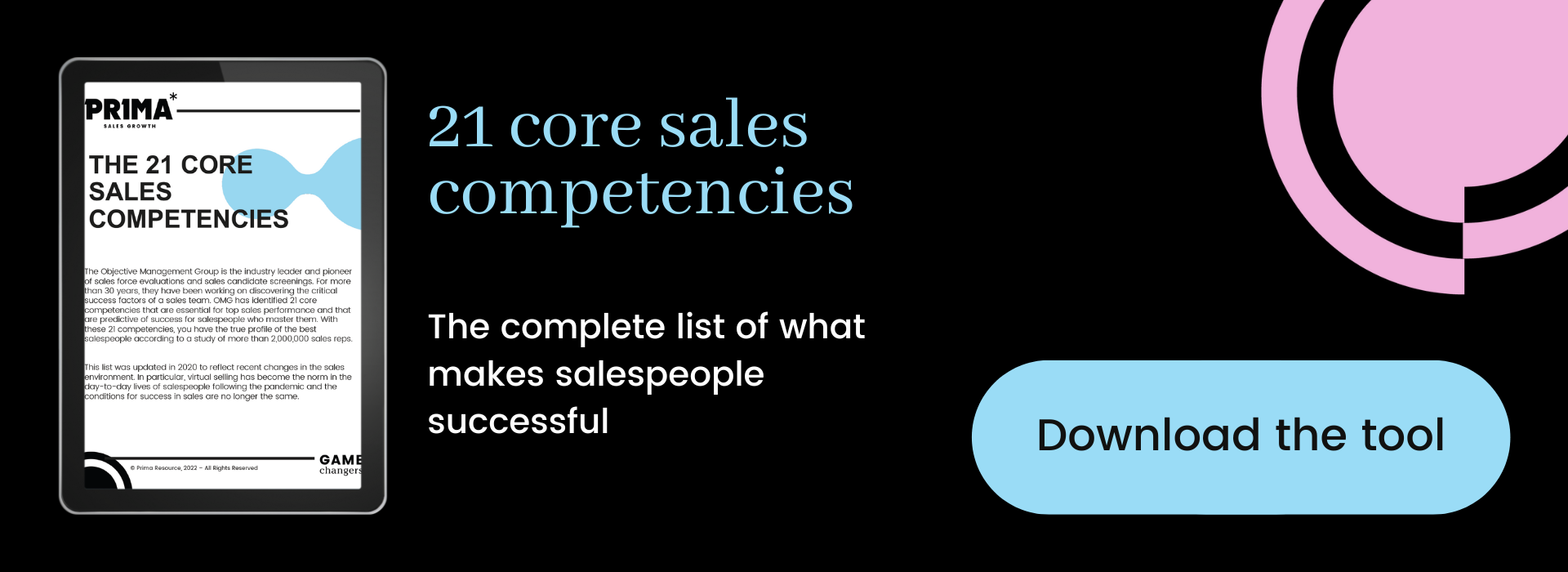
There’s a big difference between the image you certainly have of a good salesperson and reality. I regularly have the chance to present good candidates for sales positions to business leaders and sales leaders. I’m always fascinated to see how the image that people have of what a good salesperson should be doesn’t correspond to reality.
Our partner, Objective Management Group, has evaluated close to 2 Million, and I share with you what we have learned from this experience.
What to look for in a salesperson?
Our sales statistics and Sales Force Evaluations show that a good salesperson has a Sales Percentile of 95 or more. He or she must also have a Sales DNA of 84% or more. When we have these two ingredients, we have what we call an elite sales representative.
These salespeople represent only 6% of the population of individuals in a sales role. They’re sales reps who can succeed, regardless of territory, product, industry, service, process, manager… They deliver results and perform consistently.
It’s important to note that personality traits don’t correlate with sales success. Both introverted salespeople and extroverts can have success if they have the right Sales DNA and Will to Sell.
Core Sales Competencies
“Each Objective Management Group (OMG) sales force evaluation and sales candidate assessment has been tied to 21 Sales Core Competencies.” When you evaluate your team against these key competencies, you obtain an accurate picture of your team, based on the scientific study of close to 2 Million reps.
OMG updated the Core Competencies in 2017 to reflect the changes that have taken place in selling and the new skills that make the difference between reps who succeed and those who have a hard time meeting targets.
Below, you will find the 21 core competencies sorted into 3 major buckets: the Will to Sell, Sales DNA, and the tactical Selling Competencies.
Qualities of a good salesperson
|
Will to sell |
Handles rejection |
|
Desire for success in sales |
Selling competencies |
|
Commitment for success in sales |
The hunter competency |
|
Outlook |
The relationship building competency |
|
Responsibility |
The consultative seller competency |
|
Motivation |
The selling value competency |
|
Sales DNA |
The qualifier competency |
|
Doesn’t need approval |
The presentation approach and context competency |
|
Controls emotions |
The closer competency |
|
Supportive beliefs |
The milestone-centric sales process competency |
|
Supportive buy cycle |
The CRM-savvy competency |
|
Comfortable discussing money |
The mastery of social selling competency |
The will to sell competencies
The first bucket has nothing to do with experience, skills, or industry knowledge. The will to sell is really about how strong a salesperson’s will to succeed is. The attributes encompassed in this category go as follows:
- Desire for success: How badly a salesperson wants to achieve greater sales success. 88% of all salespeople strongly desire success in sales.
- Commitment for success: A salesperson’s willingness to do whatever it takes to achieve greater sales success. 63% of all salespeople are firmly committed to success in sales.
- Outlook: How a salesperson feels about their career, the vision they have for their future in sales. 64% of all salespeople have a healthy outlook.
- Responsibility: The degree to which a salesperson takes responsibility for their results instead of rationalizing or making sales excuses. Only 40% of all salespeople have strong responsibility.
- Motivation: How motivated a salesperson is to achieve success. 80% of all salespeople are strongly motivated.
Issues related to will to sell are most challenging to resolve.
These are attributes that a person carries inside of them. They can’t be taught or created. A person either wants to be the top seller, or they don’t. They’re either willing to do whatever it takes to rise above everyone else, or they’re not.
Unfortunately, many companies try to resolve these issues by modifying their compensation plan or adopting accountability procedures. However, none of these will work as they’re not addressing the real issues. They’re challenging to observe, making the 21 core competencies evaluation an essential and practical tool for managers.
Sales DNA competencies
Sales DNA is the more conceptual side and the most challenging part to evaluate by merely exchanging or discussing with a salesperson. You have to have the right assessment tool to go in depth and see this underwater part of the iceberg.
Sales DNA refers to the skills and strengths a person naturally possess. These elements can either support the salesperson’s success or sabotage efforts in the field.
Using sports analogies is an effective way to explain sales DNA.
For example, a hockey player must possess speed; it’s very advantageous for basketball players to be tall, tennis players must have precise timing on the court, etc. Athletes who lack these natural attributes but who perform well technically may still succeed in their respective disciplines, but it will require much greater effort to become a professional athlete and make a career out of it.
The same holds true for sales representatives, though height and speed have nothing to do with it. They can possess all the tactical selling techniques, but without the following six core competencies, it will be much harder to beat the competition consistently.
- No need for approval: When a salesperson needs the prospect’s approval, it prevents them from asking pointed questions, of pushing back or challenging conventional thinking. Only 38% of all salespeople don’t need approval.
- Controls emotions: A salesperson must be able to remain focused on the moment to remain actively engaged in the interaction with the prospect. Only 36% of all salespeople control emotions.
- Supportive beliefs: A salesperson’s collection of sales beliefs that support, rather than sabotage, ideal sales outcomes. Only 14% of all salespeople have supportive beliefs.
- Supportive buy cycle: Having a supportive buy cycle means buying the value of a product, instead of its price. If a salesperson tends to buy only the lowest price, he or she will not be inclined to sell value. Only 26% of all salespeople have a supportive buy cycle.
- Comfortable discussing money: A salesperson must not shy away from having an in-depth conversation about finances with the prospect. If he or she is uncomfortable discussing money, s/he will avoid digging to figure out a prospect’s real budget. Only 35% of all salespeople are comfortable discussing money.
- Can handle rejection: A salesperson who stays positive in the face of rejection can recover immediately and move on to the next target. 70% of all salespeople handle rejection.
Sales DNA is what gets the job done.
A salesperson might ask all the right questions, but if they need approval from their clients, they might not risk asking them for fear of the prospect’s disapproval.
Some reps have a low need for approval sometimes make managers uncomfortable, they might be too pushy, maybe they’re perceived as “salespeople,” or their style is abrasive and unpolished, it can be many factors.
What matters, however, is that they know how to close a deal! They possess innate sales DNA traits. Having an issue with bad customer service is more easily managed than, let’s say, a rep who falls into a slum each time they lose a sale.
Sales managers rarely address sales DNA issues during sales programs, because these attributes are so difficult to discern. They instead concentrate on tactical selling skills because they’re easier to identify.
WARNING: Sales managers shouldn’t spend all their time on selling skills, as the will to sell and sales DNA competencies are the ones representatives might need the most help with.
Tactical selling competencies
These competencies are the easiest to evaluate and develop because they’re the most obvious ones to detect.
These tactical competencies affect the main stages of sales:
- Hunting
- Consultative Selling
- Qualifying
- Closing
List of sales skills
- Hunting: A salesperson’s prospecting capacity. 40% of salespeople are strong hunters.
- Relationship building: The quality of a salesperson’s business relationships. 43% of salespeople have strong relationship building skills.
- Consultative selling: A salesperson’s ability to adopt a consultative approach to uncover the compelling reasons to buy. Only 15% of all salespeople are strong consultative sellers.
- Selling value: A salesperson’s ability to quantify the opportunity and sell the value rather than sell on price. 33% of salespeople are strongly able to sell value.
- Qualifying: A salesperson’s ability to thoroughly qualify an opportunity. 27% of salespeople are strong qualifiers.
- Presentation approach and context: A salesperson’s ability to present the right content, to the right person and at the right time. 68% of salespeople have a strong presentation approach.
- Closing: A salesperson’s ability to close deals on a routine basis. Only 3% of salespeople are strong closers.
- The milestone-centric sales process: A salesperson’s ability to follow a staged, milestone-centric sales process. 27% of salespeople have a robust milestone-centric sales process.
- The CRM-savvy: A salesperson’s mastery of CRM. 30% of salespeople are strongly CRM-savvy.
- Social selling: A salesperson’s effective, consistent use of LinkedIn, Twitter and blogging. Only 7% of salespeople have a strong mastery of social selling.
Specific competencies make it harder for managers to coach. As mentioned above, it’s much easier to fix a laziness issue than it is to motivate a person to get them out of their comfort zone.
What great salespeople do
Successful sales representatives will seek new business opportunities by prospecting, requesting references and introductions and using social sales tools. They have the DNA that allows them to:
- Ask the right questions
- Ask many questions
- Ask tough questions
- Talk about money without taboo or discomfort
- Develop relationships quickly
- Use a sales system
- Don’t have a need for approval
- Ask where potential customers will find the money to buy their solution or service
- Ask the potential client why he/she will buy
- Ask the potential client how h/she will buy
- Don’t panic and stay in control
- Don’t make excuses
- Don’t let prospects shop around
- Don’t let prospects compare vendors
- Don’t give prospects time to think
- Don’t give discounts on their prices
- Reach Decision Makers
- Make appointments
- Keep their pipeline full
- Prospect constantly
- Sell in a consultative manner
The sales force evaluation
Only a true sales force evaluation can show you what your team is made up of. A sales force evaluation should help to understand the real causes behind the observed performance problems. It’s an analysis of potential efficiency gains within the sales force.
A real evaluation is not data collection by a consultant or a personality test of individual reps. So what is a true sales force evaluation? It’s predictive of a sales rep success. To be effective, it must:
- Answer the questions of business leaders;
- Evaluate the entire sales organization in depth;
- Be focused on specific sales and sales organization management behaviors;
- Eliminate doubts and uncertainties in the actions to be taken to execute the growth strategies established by management.
When you’re evaluating a sales force, you’re looking at the strategies, processes, managers and finally, representatives. You’re assessing leaders and their impact on salespeople as well as the salespeople themselves and identify technical as well as conceptual issues.
The end goal for using the 21 core competencies evaluation is to gain an accurate overview of a rep’s sales percentile. This provides sales managers with the ability to identify and to prioritize the weaknesses which should be fixed first, resulting in overall better management and team performance.
Takeaway
Sales is ever-changing and constantly evolving. To build, maintain and grow their teams, sales leaders need great sales representatives and managers. But what is a great salesperson? What competencies do they have?
Only a true sales force evaluation can show you.
You need to analyze 3 specific areas if you want to know if you have a good salesperson:
- Their Will to Sell
- Their Sales DNA
- Their Sales Competencies
To learn more about the 21 core sales competencies, I invite you to download the complete list.
This list will allow you to go much deeper into the elements that make an individual a good salesperson.
Note: This post was originally published on April 27, 2018, and has been reviewed and revamped for accuracy and comprehensiveness.






